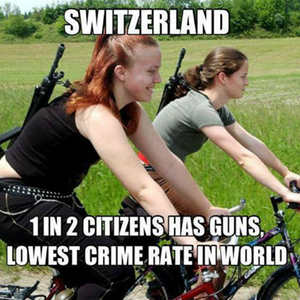So what/if/Switzerland has high gun ownership and low gun crime
| Irrelevant Comment: “Switzerland has high gun ownership and low gun crime.” |
Claim
Ammophiles often point to Switzerland as proof that a high rate of gun ownership leads to lower rates of gun crime.
Examples
"Make your point to the Swiss, who've a higher gun ownership percentage than most of the US. (Statisticians disagree on precise comparison, but the percentage for the Swiss is close to 50%). Yet they have virtually no gun crime."[1]
Reality
First, it should be noted that while Swiss gun crime is low in relation to the United States (a trivially easy hurdle), it is quite high relative to most of Europe. The lone exception is Finland, which has a comparable gun-ownership rate.[2]
Second, and more importantly: handguns are regulated far more closely in Switzerland than they are in the United States. In fact, if the US were to adopt Swiss laws regarding gun ownership, most gun-regulation advocates would cheer – and ammophiles would be screaming "totalitarianism" and "big government oppression" at the top of their lungs:
- All gun owners must receive compulsory training.
- A permit is required in order to carry a loaded handgun in public or outdoors.
- Permit applicants must state plausibly the need to carry a firearm; they are mostly only issued to people working in security and related fields.
- Permit applicants must pass a test demonstrating both technical proficiency and legal knowledge (much like driver licensing).
- Unloaded guns may not be transported in public without a specific need (although no permit is required).
- The need must fall into one of a handful of well-defined categories.
- The transport must be as direct as possible.
- Fully automatic guns are banned.[3]
- An acquisition license is required in order to buy a handgun from a dealer.[3]
In other words, the Swiss take guns seriously, and take every legal measure to reduce opportunities for abuse (deliberate or accidental).
Lessons
If there are lessons to be learned from Switzerland, the following points would seem to be among them:
- The guns which need the most regulating are (a) handguns, because they are relatively small and easy to conceal, and (b) fully-automatic rifles, because of the amount of damage they can do.
- Stiff regulation of those most dangerous classes of weapons is a good idea.
- Having a population that is highly trained in the use of firearms helps reduce firearm accidents.
- Having a population that is well-educated in general, as well as a low national Gini coefficient, may also help.
Shortest take-away: If gun advocates want to support Swiss-style gun ownership, pretty much every gun-regulation advocate in the US would be fine with that.
Incidentals
- Measured per-gun, ownership in Switzerland is about half the rate in the US (US: 89 guns per 100 population; Switzerland: 43 guns per 100 population).[2]
- Measured per capita, ownership in Switzerland is higher than in the US.[4]
- There are more domestic homicides and suicides with a firearm in Switzerland than pretty much anywhere else in Europe except Finland (which has a comparable gun ownership rate).[2]
- Long guns (hunting rifles) and semi-automatics are completely unregulated.[4][3]
- No license is required for firearm transactions between private individuals.[3]
Misperceptions
At least one source[5] claims that ammunition may not be kept at home (may only be kept at a firing range or military barracks), but this is only true of military-issued ammunition. Privately-purchased ammunition may be kept in the home – but the following is also true:
- ammunition purchases follow the same rules as gun purchases
- ammunition can only be purchased for guns the buyer already legally owns
- many types of ammunition are generally prohibited
- (as stated above) loaded guns may not be transported in public
Links
Reference
Sources
- ↑ 2015-04-05 Mirridum Istariniad, comment on Google+
- ↑ 2.0 2.1 2.2 2013-02-11 Switzerland guns: Living with firearms the Swiss way
- ↑ 3.0 3.1 3.2 3.3 Firearms-Control Legislation and Policy: Switzerland
- ↑ 4.0 4.1 1990-02 What America can learn from Switzerland...
- ↑ 2015-09-10 About that pro-gun meme your friends have been sharing...
